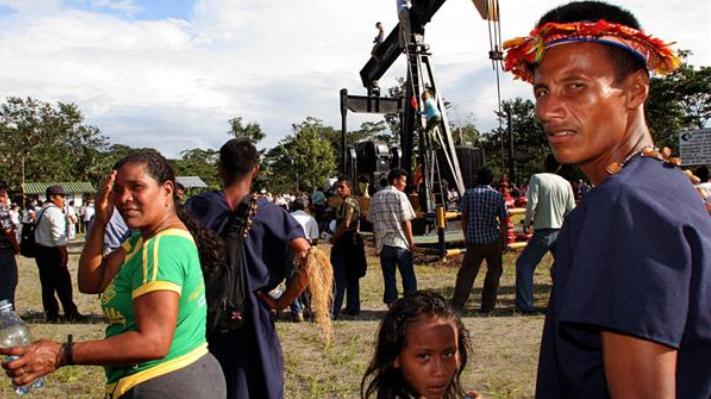
EspañolEcuadorian farmers’ long-standing claim against Chevron Corporation has just received a shot in the arm.
On Friday, September 4, Canada’s highest court ruled unanimously to allow Ecuadorian villagers to pursue a multi-billion dollar settlement against the US oil giant.
The Supreme Court’s decision means the case will proceed to a trial court in Ontario, where the oil company and Ecuadorian representatives will once again present their arguments over the disputed settlement.
In 2012, Ecuador’s highest court upheld a US$9.5 billion judgment in favor of Amazonian residents over the alleged environmental damage Chevron caused the rainforest during the 1970s and 1980s.
Ecuadorian farmers have since launched legal action in Canada, Brazil, and Argentina in order to have the judgment recognized and enforced against Chevron’s subsidiaries abroad.
“Canadian courts, like many others, have adopted a generous and liberal approach to the recognition and enforcement of foreign rulings,” the Canadian Supreme Court said. “To recognize and enforce such a judgment, the only prerequisite is that the foreign court had a real and substantial connection with the litigants or with the subject matter of the dispute.”
The court therefore rejected Chevron’s principal argument that there was no legal basis to sue the oil company in Canada. Chevron has maintained that the Ecuadorian judgment was “the product of fraud and other misconduct, and is therefore illegitimate and unenforceable.”
[adrotate group=”8″]
“The Ecuadorian sentence is illegitimate and the product of bribery and fraud,” the company affirmed in a statement. “[Chevron] believes that the Ecuadorian ruling is unenforceable in any court that respects the rule of law. It is clear that if the plaintiffs’ lawyers believed they had a legitimate claim, they would seek to enforce it in the United States, where Chevron Corporation resides.”
The company adds that it “will vigorously defend itself against any enforcement action.”
In March 2014, Judge Lewis Kaplan of the US District Court for the Southern District of New York confirmed the ruling against Chevron in Ecuador was the product of fraud and corruption.
In June 2013, the Argentinean Supreme Court overruled an embargo on Chevron Argentina’s assets, which a lower judge had ordered to be frozen in October 2012 as a precautionary measure.
Meanwhile, the Brazilian Office of the Federal Prosecutor General recommended in May 2015 that the Ecuadorian judgment against Chevron not be recognized. The office argued that the Brazilian judiciary should not enforce the foreign ruling, since “everything seems to suggest [that] it was issued in an irregular manner, especially under deplorable acts of corruption that amount to an offense against the international public order and even to good morals, with a complete lack of respect.”
Switching Sides
On September 3, California-based law firm H5, which initially represented the Ecuadorian villagers in their case against Chevron, settled with the oil company and withdrew its claim to 1.25 percent of the $9.5 billion sentence.
“Chevron is pleased that H5 has ended its association with this scheme,” Chevron’s vice president and general counsel R. Hewitt Pate said in a press release. “Chevron is also pleased that H5 has taken the further action of disclaiming any interest in the Ecuadorian judgment and relinquishing its interest to Chevron. It remains Chevron’s intent to hold accountable those responsible for what a federal judge found to be a fraud.”
H5 has become part of the growing list of companies, investors, law firms, tech consultants, and Ecuadorian court officials that, since 2010, have withdrawn as plaintiffs and no longer support the South American government’s claim.
Woodsford Litigation Funding Limited, James Russell DeLeon, and Jeffrey Shinder are among those who have switched sides. Shinder is a New York-based lawyer, who abandoned the Ecuadorian legal team after discovering the extent of the alleged fraud, claiming the revelation made him “sick.”
 Versión Español
Versión Español












